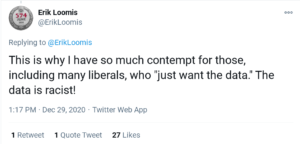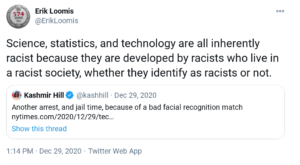Science, statistics, and technology are all inherently racist because they are developed by racists who live in a racist society, whether they identify as racists or not. https://t.co/M36hFwuODA
— Erik Loomis (@ErikLoomis) December 29, 2020
This is why I have so much contempt for those, including many liberals, who "just want the data." The data is racist!
— Erik Loomis (@ErikLoomis) December 29, 2020
You, sir, are WRONG! The data *are* racist.
I will await you're apology and correction.
— Asano Sokato (@ASokato) January 23, 2021
https://twitter.com/YumiRhee/status/1353107326660534272
As a statistician I formally declare that you’re talking utter bullshit.
— Alex Whitehouse (@philo_sofa) January 25, 2021
EVERYTHING IS RACIST!!!
— ThoughtsByMatt Starts Here (@ThoughtsByMatt1) January 23, 2021


Analysis below By Professor Jonathan Turley, is a nationally recognized legal scholar
We have previously discussed the radical declarations of the University of Rhode Island and Director of Graduate Studies Erik Loomis who has defended the murder of a conservative protester and said that he saw “nothing wrong” with such acts of violence. (A view defended by other academics). Loomis is now back in the news with a declaration that “Science, statistics, and technology are all inherently racist because they are developed by racists who live in a racist society, whether they identify as racists or not.” It is a curious position from the person who heads graduate studies at the University of Rhode Island.
For many, science and statistics are fields that are inherently objective not racist. While racism can certainly impact any field in a myriad of ways, these fields are based on proven experiments and calculations. One can support scrutiny of our programs to root out racism without dismissing all fields as “inherently racist.” Yet, this view of math and science is being voiced by others, including those who denounce math as a “tool of whiteness.”
Loomis’ statement came as part of a tweet in reference to a New York Times article and added “This is why I have so much contempt for those, including many liberals, who ‘just want the data.’ The data is racist!”
I have defended the right of Loomis to make his past comments as a matter of free speech. While Loomis has shown nothing by intolerance for opposing views, he has every right to express disturbing, extremist views.
On this occasion, he is making a statement that would appear to undermine the basis for graduate studies at his school and other schools. While I still view the statements as protected, they would appear to undermine faith in the basis of much of the work of his colleagues. The tweet prompted University of Rhode Island Assistant Director of Communications Dave Lavallee to issue a statement:
“Mr. Loomis’ recent social media posts on science, statistics and technology are entirely his own opinions, and in no way represent the positions or values of the University of Rhode Island..His recent tweet runs completely counter to URI’s first Cornerstone Value, which says, ‘We pursue knowledge with honesty, integrity and courage.
In making such remarks, Mr.Loomis calls into question the work of thousands of researchers and scientists across the country and particularly the outstanding work done by our talented and diverse researchers at URI. While Mr. Loomis has a First Amendment right to make such comments as a private citizen, he does not have the right to make such unsubstantiated claims in the context of his university position or role.”
From my perspective, the most important aspect of that statement is the acknowledgment that Loomis has First Amendment protections in uttering such viewpoints. The question for the university is whether those viewpoints undermine his role in leading all graduate studies, particularly in dismissing the very basis for much of that work as racist. Loomis claims that “all” science, statistics, and technology is racist. Period. It is a patently absurd statement that is devoid of any intellectual foundation or inquiry. It will certainly appeal to many who relish extremist and rejectionist views, including some in academia. However, it is the very antithesis of our intellectual mission as scholars and it does a great disservice to the many respected academics at the University of Rhode Island.
Nevertheless, Loomis wrote a column entitled “When Fascists Attack” for the site Lawyers, Guns, and Money. Loomis is listed as as one of a handful of “members” who contribute to the site. (For the record, that is the same site that ran a column by a Colorado law professor who claimed that raising questions about the 2020 was akin to Holocaust denial. That attack occurred a few days after the election when I noted that there were irregularities in the election, including an error in reporting the results from a district using Dominion software. I noted that the error involving a few thousand votes that was quickly corrected, did not indicate any widespread fraud, and would not affect the outcome of the election. It merely raised the question of whether such systems were still vulnerable to “human error.” The site denounced that statement was akin to denying that the Holocaust ever occurred.)
In his column, Loomis blasts the university by writing: “I guess this is how my administration responds to the need for anti-racism in American life and on campus, by openly throwing professors who talk about racism and technology under the fascist bus. Great job URI.” It appears that now Rhode Island, in Professor Loomis’ view, is opposing anti-racism efforts and supporting fascists by rejecting his view of science, statistics, and technology.
Loomis insists that his rejection of all science, statistics, and technology as racist was
“utterly uncontroversial point that when facial recognition technology is throwing innocent Black people in prison, it reflects much larger problems of how racism influences our technology and science in an inherently racist society. … This is…utterly uncontroversial? Or it should be anyway. We see this over and over and over again, from how the medical profession ignores pain in Black patients no matter their social status, how Black people are wary of the vaccine because of traditionally poor treatment by the scientific community, how all sorts of forms of technology end up exacerbating discrimination, etc.”
What is striking about this response is that it is divorced from his actual statement. It is raising insular issues like facial recognition that have been discussed by others without rejecting the entirety of science or statistics. Indeed, I just published a long study that addressed that issue and its underlying causes as part of a comprehensive look at biometrics and privacy. See Jonathan Turley, Anonymity, Obscurity, and Technology: Reconsidering Privacy in the Age of Biometrics, 100 Boston University Law Review 2179 -2261 (2020).
Loomis’ reference a couple of specific areas where racism is a well-documented problem and many of us have sought to suggest ways to address racial injustice. It is not a defense of Loomis’ categorical rejection of all science, statistics, and technology. That view is not “uncontroversial,” it is unhinged and irrational.
Related Links:
NASA official Aug. 5 statement: “It has become clear that certain cosmic nicknames are not only insensitive but can be actively harmful. NASA is examining its use of unofficial terminology for cosmic objects as part of its commitment to diversity, equity, and inclusion….The Agency will be working with diversity, inclusion, and equity experts in the astronomical and physical sciences to provide guidance and recommendations for other nicknames and terms for review.”
“NASA will no longer refer to planetary nebula NGC 2392 as the “Eskimo Nebula.” “Eskimo” is widely viewed as a colonial term with a racist history, imposed on the indigenous people of Arctic regions.” – “NASA will also no longer use the term ‘Siamese Twins Galaxy’ to refer to a pair of spiral galaxies.”
Thomas Zurbuchen, associate administrator of NASA’s Science Mission Directorate at Headquarters in DC: “Our goal is that all names are aligned with our values of diversity and inclusion, and we’ll proactively work with the scientific community to help ensure that.”
#
Reaction was swift: “Seriously: Is this what is holding us back in space? Is the Sombrero Galaxy anti-Mexican? Is the Bullet cluster too violent? Should we now say “holes of color”? wrote Eric Weinstein. “Isn’t this mostly just wallowing?” he added. “Dwarf stars will henceforth be known as volumetrically challenged stars,” a Twitter critique noted.
#

Climate Depot Response: The wacky world of warmism strikes again. This is just the latest in a round of racially charged climate conflicts and identity politics within the ‘global warming’ movement. Climate Change activism is increasingly being divided into gender, racial and age categories.


VICE MAG: “Climate grief, a psychological phenomenon that affects Black and Indigenous peoples, and other people of color, in uniquely devastating ways…Black and Indigenous peoples, to bear the brunt of global disaster.” …
“We carry the pain of the climate crisis deep inside us…Our grief—and our anger—is rooted in centuries of painful history, and the current ecological violence hurled at our communities.” …
“Just like other stressors that people of color experience, ecological grief is often magnified,” said Dr. Tyffani Dent, a licensed psychologist and author said. …
“Research has bolstered the idea that white supremacy has led to the climate crisis.” …
“Hope is such a white concept.” Hope is “such a white concept,” Heglar said. “You’re supposed to have the courage first, then you have the action, then you have the hope. But white people put hope at the front. Their insistence on hope for all of these years has led to exactly where? Nowhere.”
Flashback: Bill Nye: Old People Have To Die For Us To Stop Global Warming
The Environmental Movement Needs to Reckon with Its Racist History – Because racism in environmentalism hasn’t gone away, and it’s holding the movement back. – By Julian Brave NoiseCat – Indigenous peoples and people of color are disproportionately affected by our global climate crisis. But in the mainstream green movement and in the media, they are often forgotten or excluded. This is Tipping Point, a new VICE series that covers environmental justice stories about and, where possible, written by people in the communities experiencing the stark reality of our changing planet.
Why I Quit Being a Climate Activist – “The climate movement is overwhelmingly white. So I walked away.” – By Karin Louise Hermes – But after a while I realized I would only be called upon when climate organizations needed an inspiring story or a “diverse” voice, contacts for a campaign, or to participate in a workshop for “fun” when everyone else on the (all-white) project was getting paid. Whenever I would question the whiteness of these spaces and how strategies didn’t take race into account, I would be met with uncomfortable silences. The last time, at a nationwide movement-building workshop last April, I was asked, “Well then, why are you even here?” So I decided not to be there anymore. After four years of helping organize direct actions, speeches, workshops, and countless video calls, I started hiding and declining requests. I was burned out.




